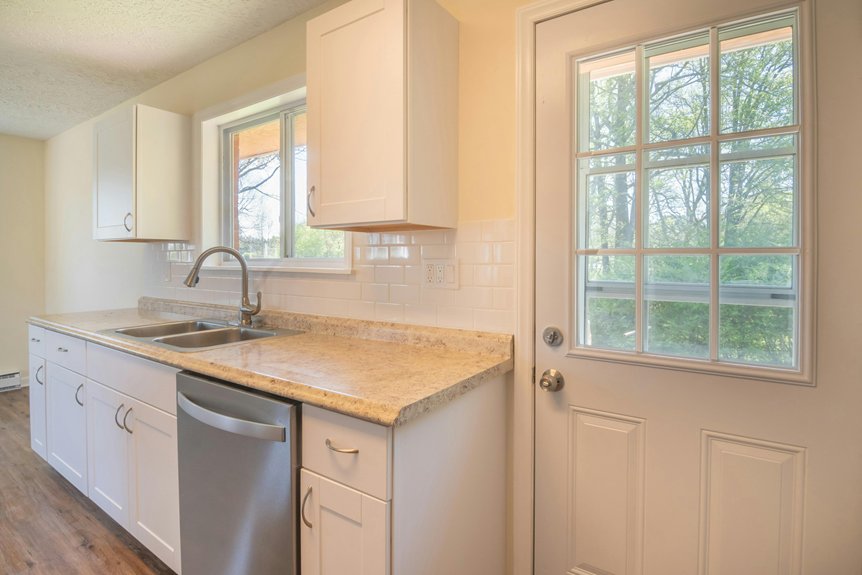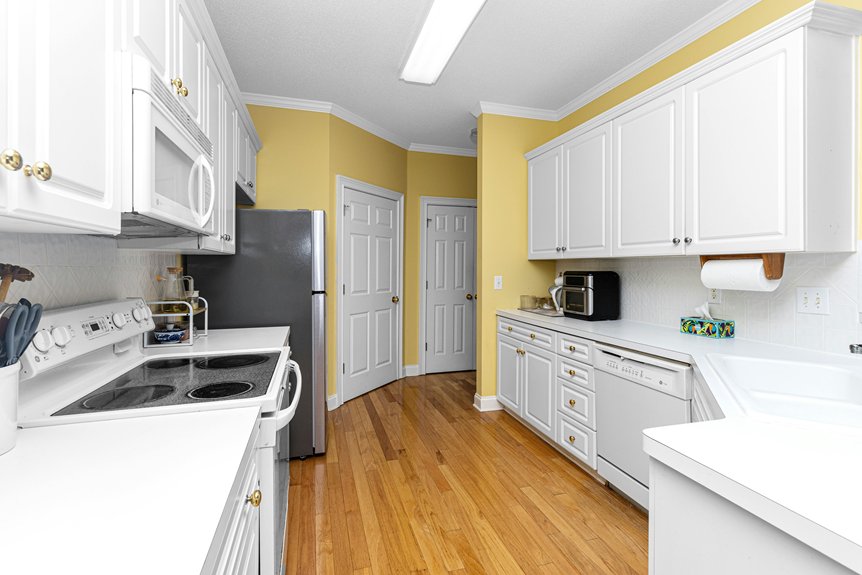If you’re considering a kitchen remodel, you might wonder whether those expenses can be tax deductible. Certain improvements to your primary residence could qualify, especially if they increase your home’s value or serve a new purpose. However, the specifics can be complex. Understanding when these deductions apply and how they affect your tax situation is essential. Are you ready to explore the nuances that could impact your financial decisions?
Key Takeaways
- Kitchen remodeling is generally not tax-deductible unless it enhances home value or adapts the space for business use.
- Energy-efficient upgrades in the kitchen may qualify for specific tax credits or deductions.
- Detailed record-keeping of all renovation expenses is essential for justifying any potential tax claims.
- If the kitchen is part of a home office, related expenses may be deducted on taxes.
- Selling your home after remodeling can affect capital gains tax, depending on the increase in home value.
Understanding Tax Deductions for Home Improvements
When you consider remodeling your kitchen, it’s important to understand how home improvements can impact your taxes.
Home improvement basics include knowing that not all renovations qualify for tax deductions. To determine eligibility, you must meet specific tax deduction criteria, such as the nature of the improvement and its purpose.
Improvements that enhance your home’s value, adapt it for medical needs, or are part of a home office may be deductible.
Always maintain thorough records of expenses, as documentation is vital for justifying any claims.
When Kitchen Remodeling Qualifies for Tax Deductions
When considering kitchen remodeling for tax deductions, you should first guarantee that the improvements are made to your primary residence.
If you use part of your home for business, you can explore home office deductions that may apply.
Additionally, upgrades focused on energy efficiency can qualify for specific tax credits, making your renovation not only stylish but also financially savvy.
Primary Residence Requirement
To qualify for tax deductions related to kitchen remodeling, it’s essential that the improvements are made to your primary residence.
The IRS typically allows deductions for renovations that enhance your home’s value or adapt it for new uses. However, your tax eligibility hinges on the property’s status as your primary residence.
If you’re remodeling a rental or vacation home, those expenses won’t qualify for deductions. Keep thorough records of all expenses and improvements, as these can be important when determining your tax benefits.
Ultimately, ensuring your project aligns with primary residence requirements is essential for maximizing your deductions.
Home Office Deductions
Home office deductions can provide significant tax benefits, especially if your kitchen remodeling project includes modifications that support your work-from-home setup.
If you use part of your kitchen exclusively for business, such as a designated workspace or storage for supplies, you may qualify for tax deductions.
Track expenses related to the remodel, including materials and labor, that directly enhance your home office area.
Remember, the IRS requires that expenses be ordinary and necessary for your business.
Energy Efficiency Improvements
Incorporating energy-efficient improvements during your kitchen remodeling can’t only enhance the functionality of your space but also offer potential tax deductions.
When you invest in energy-efficient appliances, windows, or insulation, you may qualify for tax incentives. To maximize your benefits, consider getting energy audits conducted before and after your remodel; these assessments can help document improvements and identify additional savings.
The IRS often provides deductions for specific upgrades that meet energy efficiency standards. By focusing on these enhancements, you not only contribute to a sustainable environment but also create financial advantages for yourself in the long run.
Tax Implications of Selling Your Home After Remodeling
When you sell your home after a kitchen remodel, you need to take into account capital gains tax implications.
Understanding how renovation costs can affect your profit and knowing the timing of your sale are vital for maximizing your financial return.
Each aspect can greatly influence your overall tax liability, so it’s essential to analyze them carefully.
Capital Gains Tax Implications
Selling your home after a remodel can greatly impact your capital gains tax situation. When you sell, the IRS typically taxes the profit from the sale, known as capital gains.
If your renovations considerably increase your home’s value, this profit could rise, leading to higher taxes. However, certain exclusions may apply; for instance, if you’ve owned the home for at least two years, you could exclude up to $250,000 ($500,000 for married couples) of capital gains.
Understanding these tax implications before selling is essential to optimize your financial outcome post-remodeling and avoid unexpected tax burdens.
Renovation Costs Recovery
Although remodeling your kitchen can greatly enhance your home’s appeal and value, the recovery of those renovation costs during a sale isn’t always straightforward. Effective renovation budgeting and a detailed cost analysis can help you understand what you might recoup.
| Renovation Type | Average Cost | Potential Value Increase |
|---|---|---|
| Minor Remodel | $20,000 | $15,000 |
| Major Remodel | $50,000 | $30,000 |
| High-End Upgrade | $80,000 | $50,000 |
Ultimately, knowing your local market and how renovations fit into it can greatly impact your financial outcomes when selling.
Timing of Sale Matters
Understanding the timing of your sale can greatly influence the tax implications associated with selling your home after a remodeling project.
Your remodeling timeline matters; if you sell shortly after renovations, you mightn’t fully recoup your costs due to depreciation. A well-planned sale strategy can maximize your return, allowing you to benefit from increased home value.
Ideally, hold off on selling for at least a few years to demonstrate your home’s appreciation and validate your investment. This approach not only enhances your financial outcome but also minimizes potential tax liabilities associated with short-term capital gains.
Documenting Your Kitchen Renovation Expenses
When it comes to documenting your kitchen renovation expenses, having a systematic approach can make all the difference.
Start with thorough expense tracking; categorize costs like materials, labor, and permits. Keep all renovation receipts organized—consider using digital tools or spreadsheets for easy access.
Each receipt should clearly show the date, vendor, and amount spent. Don’t forget to note any additional expenses related to the project, like design consultations.
This meticulous record-keeping not only helps you understand your spending but also prepares you for potential tax deductions. Proper documentation can be invaluable when evaluating your home’s value later on.
Potential Tax Benefits for Energy-Efficient Upgrades
As you document your kitchen renovation expenses, consider that energy-efficient upgrades can greatly enhance your potential tax benefits.
Many homeowners qualify for energy saving incentives when they opt for eco-friendly renovations, such as Energy Star appliances or energy-efficient windows.
These upgrades not only lower your utility bills but can also provide significant tax credits or deductions.
Research federal and state programs that encourage sustainable practices.
By investing in energy-efficient materials and systems, you can maximize your tax advantages while contributing to environmental sustainability.
Always keep track of all related expenses to guarantee you’re well-prepared for potential savings come tax season.
Consulting a Tax Professional for Personalized Advice
While many homeowners may feel confident managing their kitchen remodeling finances, consulting a tax professional can provide invaluable insights tailored to your specific situation.
A tax expert can help you navigate complex tax strategies and identify potential deductions you might overlook. They can assess how your remodeling project aligns with your overall financial planning, ensuring you maximize benefits while staying compliant.
Additionally, they can advise on the long-term implications of your investments, helping you make informed decisions that could impact your tax situation in the future.
Ultimately, their expertise can save you money and prevent costly mistakes.
Conclusion
In summary, while kitchen remodeling can be tax deductible under specific circumstances, it’s essential to understand the nuances. If your upgrades enhance your home’s value or adapt it for new uses, you may benefit. Don’t forget to document all expenses meticulously, as this can substantiate your claims during tax preparation. Additionally, consider energy-efficient improvements for potential credits. Consulting a tax professional can help you navigate these complexities and maximize your deductions effectively.




